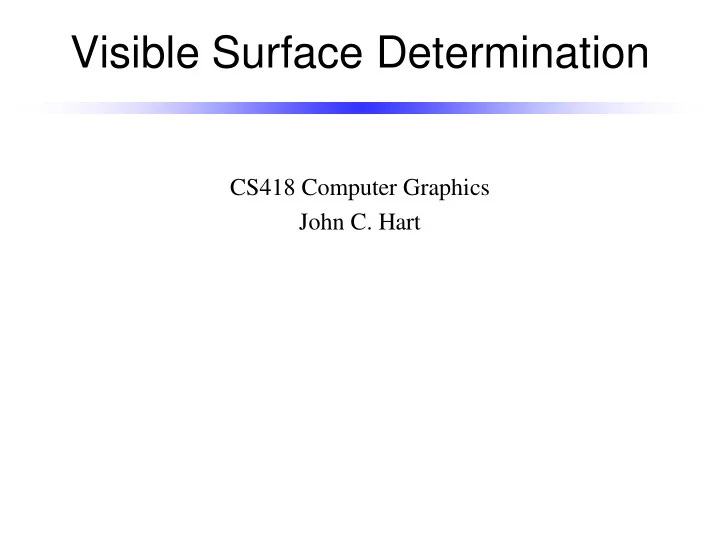

Visible Surface Determination CS418 Computer Graphics John C. Hart
Painter’s Algorithm • Display polygons in back-to-front order • Sort polygons by z-value -z – Which vertex? – O ( n log n ) • Problems…
Quadtree Algorithm • Sort polygons • Subdivide screen until each region contains one or zero edges • Invented by John Warnock in 1969
Quadtree Algorithm • Sort polygons • Subdivide screen until each region contains one or zero edges • Invented by John Warnock in 1969
Quadtree Algorithm • Sort polygons • Subdivide screen until each region contains one or zero edges • Invented by John Warnock in 1969
Quadtree Algorithm • Sort polygons • Subdivide screen until each region contains one or zero edges • Invented by John Warnock in 1969
Quadtree Algorithm • Sort polygons • Subdivide screen until each region contains one or zero edges • Invented by John Warnock in 1969
Z-Buffer -far -far -far -far Key Observation: Each pixel displays -far -far color of only one triangle, ignores -far everything behind it -far -far • Don’t need to sort triangles, just find -far -far for each pixel the closest triangle -far framebuffer zbuffer • Z-buffer: one fixed or floating point value per pixel • Algorithm: For each rasterized fragment ( x , y ) If z > zbuffer( x , y ) then framebuffer( x , y ) = fragment color zbuffer( x , y ) = z
Z-Buffer -far -.1 -.2 -.3 Key Observation: Each pixel displays -.4 -.5 color of only one triangle, ignores -.6 everything behind it -.7 -.8 • Don’t need to sort triangles, just find -far -far for each pixel the closest triangle -far framebuffer zbuffer • Z-buffer: one fixed or floating point value per pixel • Algorithm: For each rasterized fragment ( x , y ) If z > zbuffer( x , y ) then framebuffer( x , y ) = fragment color zbuffer( x , y ) = z
Z-Buffer -far -.1 -.2 -.3 Key Observation: Each pixel displays -.4 -.3 color of only one triangle, ignores -.1 everything behind it -.7 -.8 • Don’t need to sort triangles, just find -far -far for each pixel the closest triangle -far framebuffer zbuffer • Z-buffer: one fixed or floating point value per pixel • Algorithm: For each rasterized fragment ( x , y ) If z > zbuffer( x , y ) then framebuffer( x , y ) = fragment color zbuffer( x , y ) = z
Z-Buffer -far -.1 -.2 -.3 • Get fragment z-values by interpolating -.4 -.3 z-values at vertices during rasterization -.1 -.7 -.8 • Perspective projection destroys -far -far z-values, setting them all to – d -far framebuffer zbuffer • Need a perspective distortion that preserves at least the ordering of z-values
Normalized View Volume glFrustum(left,right,bottom,top,near,far) y y (-1,1,1) 1 z z (0,0,-far) y x x -1 x -1 1 z 1 -1 Screen Clip Viewing World Model W2V Persp View Model Coords Coords Coords Coords Coords
Perspective Projection screen y y view y clip -z z view d x view y z / d 1 x x y clip view view view view d z 1 y y y view view view view z / d y 1 z z view view view view y clip z view / d d 1/ d 0 1 z / d view 1
Perspective Distortion screen y y view y clip -z z view 1 x view z view 1 x x view view y view y 1 y y view view view y z clip view z z z view view view 1 0 1 z view z view 1
Distorted z-Values z 1 z 2 - z if z 1 > z 2 then - – / z 1 > - – / z 2 1/- z curve - – / z 1 - – / z 2 - - – / z x view z view 1 x x view view y view y 1 y y view view view y z clip view z z z view view view 1 0 1 z view z view 1
Normalized Perspective Distortion y y (-1,1,1) 1 z z (0,0,-far) y x x -1 x -1 1 z 1 -1 2 near right left right left right left 2 near top bottom top bottom top bottom far near 2 far near far near far near 1 0
Hierarchical Z-Buffer -.2 -.3 -.3 • Invented by Ned Green in 1994 -.5 -.4 -.5 -.5 • Creates a MIP-map of the z-buffer -far -.6 -.7 -.7 – z-value equal to farthest z-value of -far -.8 -far -far its four children framebuffer hierarchical zbuffer • Before rasterizing a triangle… – Check z-value of its nearest vertex against z-value of the smallest quadtree cell containing the triangle – If z-test fails, then the entire triangle is hidden and need not be rasterized • Works best when displaying front-to-back
Recommend
More recommend